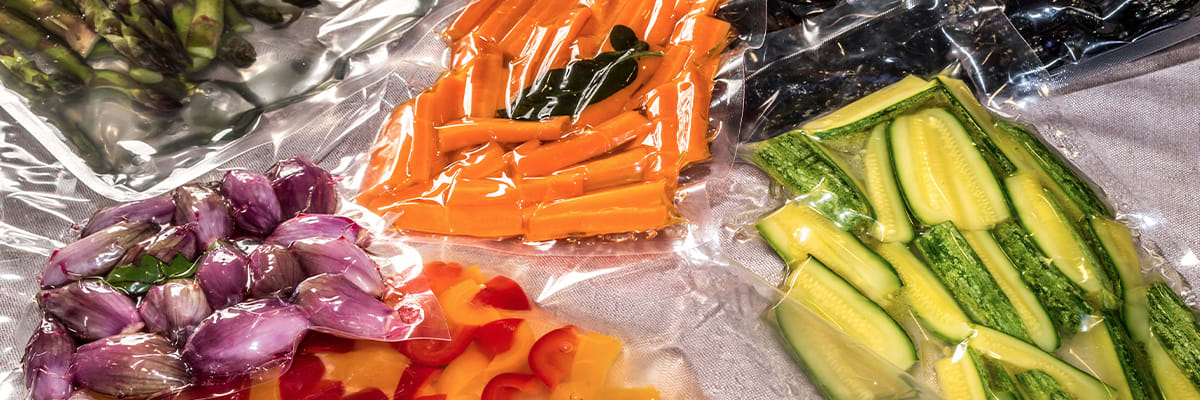
Return navigate_next
Pros and Cons of Using a Vacuum Sealer For Food
June 10, 2022 *
If you haven’t used one before, you probably haven’t considered whether or not it’s worth it to vacuum seal your food. Before you make your decision, let’s explore the pros and cons of a vacuum sealer for food.
What is a Vacuum Sealer for Food?
Many people are choosing to eat healthier these days. As a result, many are shopping at organic food markets and co-ops to ensure the food they eat is healthier and devoid of pesticides and hormones. Other people are choosing to grow their own food in backyard gardens.
The problem is that fresh food spoils quickly. The solution is a vacuum sealer which allows you to store the food longer and eat it later. Statistics show that food sealed with a vacuum sealer can last up to five times as long as non-sealed food. It works by vacuuming out all the air/oxygen, which is what causes food to spoil. Then, the food is heat-sealed in an air-tight container until you are ready to use it.

The Pros of Using a Vacuum Sealer for Food
Some would say that a vacuum sealer is the small appliance you didn’t know you needed. Some pros in support of using a vacuum sealer are:
Saves time – If you vacuum seal individual portions, you can open your fridge or freezer, and you’re ready to go. Less prep time means more time for you.
Saves money – You can buy foods in bulk at a lower price, and if you purchase high-quality foods that spoil, it’s like throwing money in the trash. With vacuum sealing, you can store food longer and retain that value.
Stores food much longer – Freezer vacuum-sealed foods can last up to 2-3 years, and refrigerated food can last 1-2 weeks. Most perishables only last days.
Prevents freezer burn – By removing the air from the freezer bag, vacuum sealing prevents freezer burn and food breakdown.
Saves space – Vacuum sealed bags are smaller and tighter than other packaging; therefore, you can store more in your fridge or freezer.
The Cons of Using a Vacuum Sealer for Food

As with everything, there are cons to go along with the pros of using a vacuum sealer for food. Some of the negatives include:
Special bags required – Vacuum sealer appliances require special bags, and that expense can add up over time.
Bags not reusable – Many of the required bags are not reusable. Therefore, it can get costly to buy a bunch of single-use containers, not to mention it’s bad for the environment.
Expensive – Many of these appliances are quite expensive. You can shop around for deals, but you will still spend a lot on the initial investment.
Only work with certain foods – Not all foods can be vacuum sealed. Consider how you will use it and if one will work for you.
Not a perfect system – Vacuum sealers are not a perfect solution. Even when used correctly, some foods may still spoil.
Warranty Considerations
There are many different types of vacuum sealers available on the market. Some are better than others. For example, some use plastic parts in vital components like the pump, whereas others use metal. It’s important to do your research before buying and find the best value of quality versus price.

Before purchasing any small appliances for your kitchen, especially a vacuum sealer, consider the vacuum sealer warranty. How long will it last, and how well will it protect your new gadget? Unfortunately, most small appliance warranties only last a short time and only cover the manufacturer’s defects.
A better option is to protect your appliances with an Upsie warranty. To find out more, you can check out the pros and cons of an extended warranty.
With Upsie, you can file a claim at any time of day or night. Send in your small appliance, and Upsie will pay for two-day shipping, or you can use a local certified repair technician to have it fixed. If they can’t fix it on the first claim, Upsie will replace it.
Many things can go wrong even with newer appliances. Upsie covers motor issues, mechanical failure, power issues, heating and cooling problems, and much more! With Upsie, you pay up to 70% less than the competition, and you can even transfer your warranty along with the item when you sell it or give it away.
Enjoy peace of mind by protecting all your small appliances with Upsie!
Learn More About Small Appliances:
* This article is over 6 months old and may or may not be updated.
